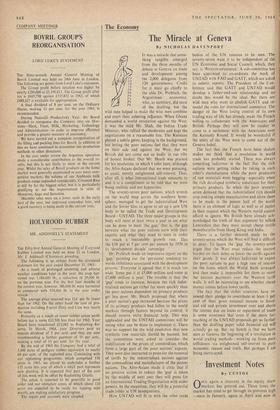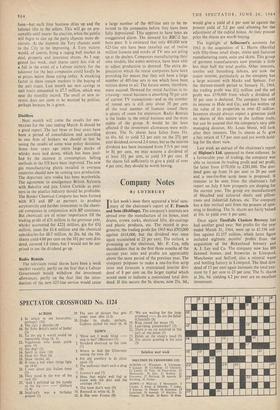• Investment Notes
By CUSTOS.
ONCE again a recovery in the equity share markets has petered out. Three times the market has tried to go through its previous high --once in January, again in April and now in June-but each time business dries up and the balance tilts to the sellers. This will go on pre- sumably until nearer the election, when the public will begin to size up the party chances more de- cisively. At the moment the Tory chances seem to the City to be improving. A Tory victory would, of course, bring a raging bull market in steel, property and insurance shares. As I sug- gested last week, steel shares carry less risk of a fall in the event of a Labour victory, for the takeover for the best companies could hardly be at prices below those ruling today. A steadying factor in these seesaw markets is the buying of the unit trusts. Last month net new savings in unit trusts amounted to £7.7 million, which was near the monthly record. The small or new in- vestor does, not seem to be worried by politics, perhaps because he is green.
Distillers
Next month will come the results for DIS- TILLERS for the year ending March. It should be a good report. The last three or four years have been a period of consolidation and according to one firm of brokers we should at last be seeing the resulti of some wise policy decisions. Some four years ago extra large stocks of whisky were laid down, which has been justi- fied by the increase in consumption. Selling methods in the US have been improved. The new gin manufacturing plants installed in overseas countries should now be coming into production. The departure into vodka has been worthwhile. The agreement to amalgamate British Xylonite with Bakelite and join Union Carbide as part- ners in the plastics industry should be profitable. The Border Chemical Company has been formed with ICI and BP as partners to produce acrylonitrile and further investment in the chemi- cal companies in conjunction with BP continues. But chemicals are of minor importance. Of the trading profit of £31 million in the previous year, whisky accounted for £22+ million, gin for £31 million, yeast for £1.4 million and the chemical subsidiaries for £0.7 million. At 26s. 6d. the 10s. shares yield 4.00 per cent on the 10+ per cent divi- dend, covered 1.8 times, but I would not be sur- prised to see the dividend go up.
Radio Rentals The television rental shares have been a weak market recently, partly on the fear that a Labour Government would withdraw the investment allowances, partly on the fear that the intro- duction of the new 625-line service would cause
a large number of the 405-line sets to be re- turned to the companies before they have been fully depreciated. This appears to have been an exaggerated alarm. The demand for BBC-2 has been poor. It is estimated that only 400,000 new 625-line sets have been installed out of twelve million licences and stocks of TV sets are piling up at the dealers. Companies manufacturing their own models, like RADIO RENTALS, have been able to adjust production to demand. The extra de- preciation which the rental companies have been providing for means that they will have a large number of 405-line sets in use which have been written down to nil. The future seems, therefore, more assured. Demand for rental facilities is in- creasing-rental business is absorbing 70 per cent of current TV transactions-and as the number of rented sets is still only about 35 per cent of the total number of licences issued there is plenty of room for expansion. Radio Rentals is the leader in the rental business and the most stable of the group. It would be the least affected if the investment allowances were with- drawn. The 5s. shares have fallen from 51s. to 41s. 6d. to yield 3.2 per cent on the 27+ per cent dividend,covered 2.4 times, but as the interim dividend has been increased from 5 5/6 per cent to 8f per cent, we may assume a dividend of at least 32+ per cent, to yield 3.9 per cent. If the shares fall sufficiently to give a yield of over 4 per cent, they should be worth having.



































 Previous page
Previous page